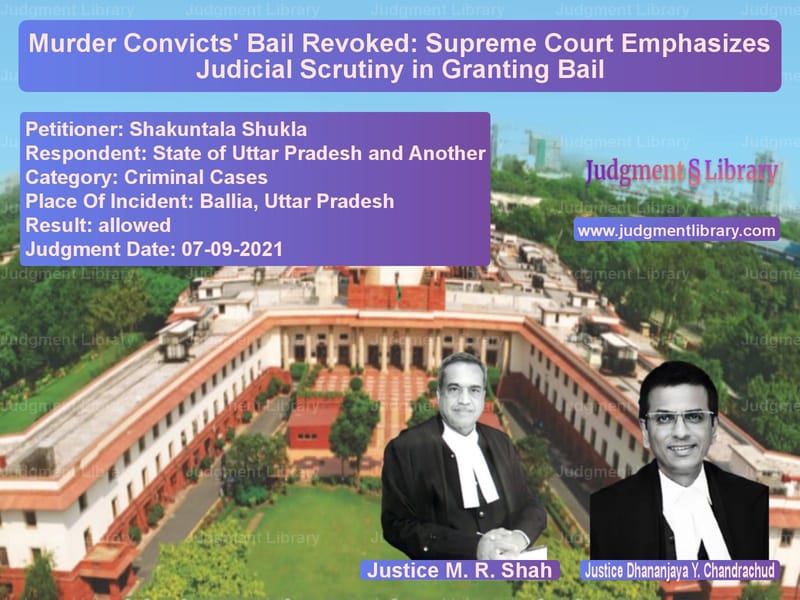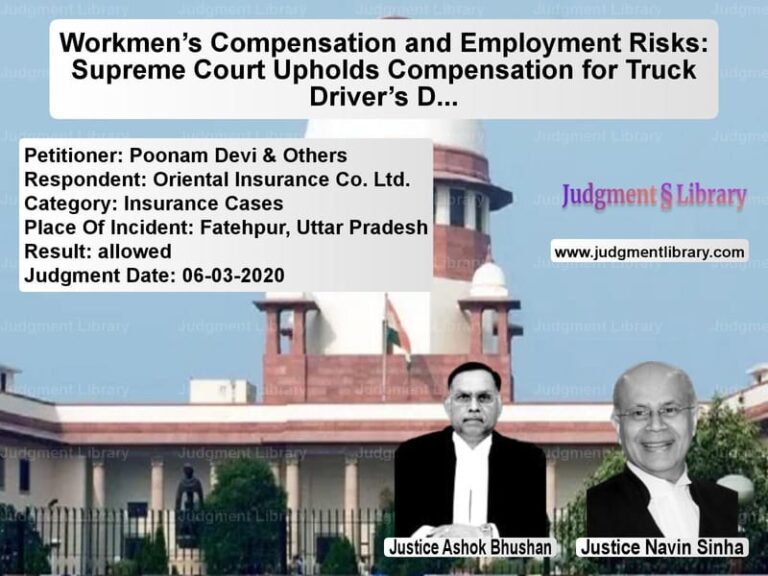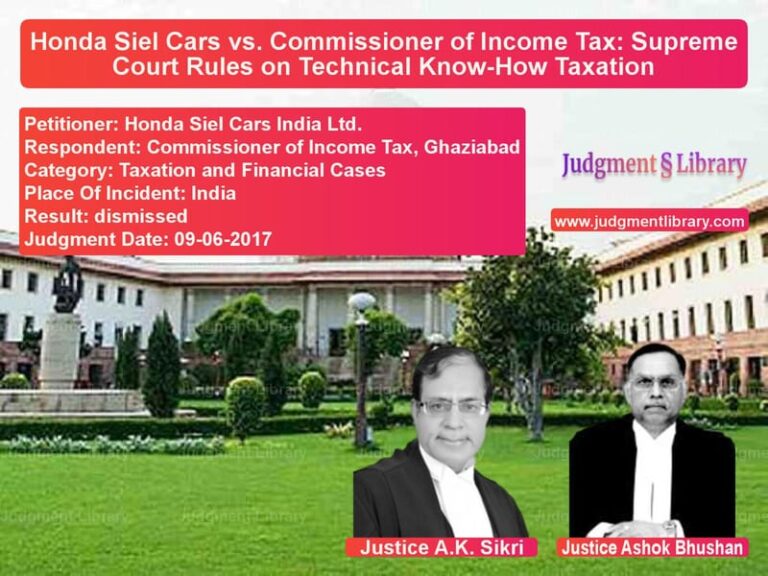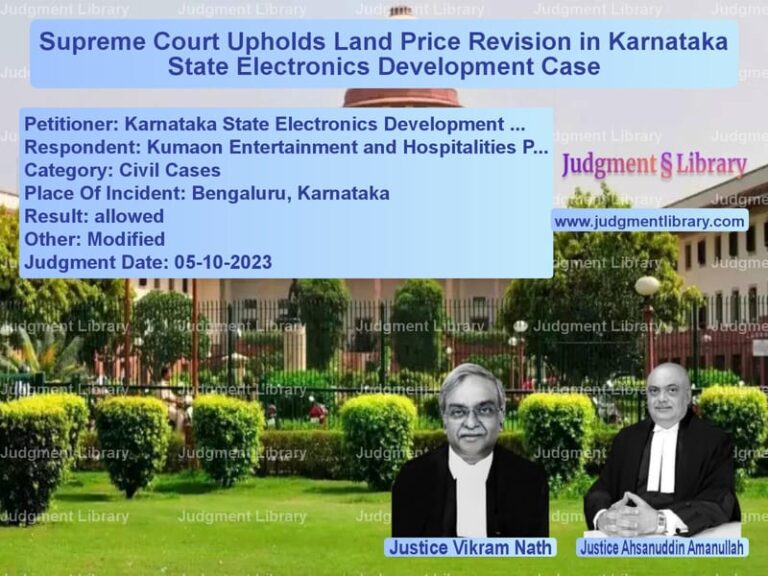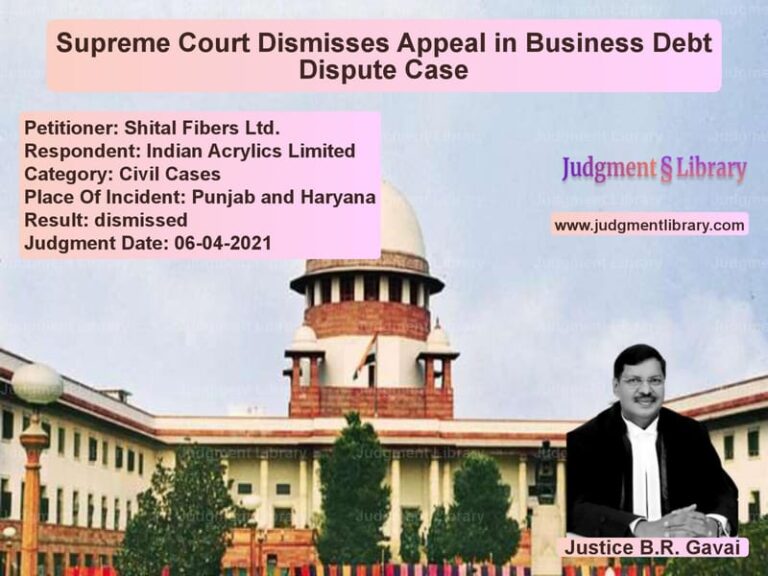Murder Convicts’ Bail Revoked: Supreme Court Emphasizes Judicial Scrutiny in Granting Bail
The case of Shakuntala Shukla v. State of Uttar Pradesh and Another is a significant judgment by the Supreme Court of India concerning the grant of bail to individuals convicted of murder. The case raises crucial questions regarding the principles courts must follow while granting bail, especially to those convicted under serious criminal charges such as murder, conspiracy, and destruction of evidence.
The Supreme Court was called upon to decide whether the High Court of Allahabad had erred in releasing the accused persons on bail while their appeal against conviction was pending. The original complainant, Shakuntala Shukla, widow of the deceased, challenged the bail orders, arguing that the accused had been convicted based on substantial evidence and that granting them bail would undermine justice.
Background of the Case
The case revolves around the murder of Kripa Shankar Shukla, whose dead body was found in a well in Ballia, Uttar Pradesh, on October 28, 1995. The initial police investigation failed to establish any foul play, and local authorities concluded that the deceased had died due to drowning. However, a subsequent investigation by the Crime Branch-Criminal Investigation Department (CB-CID) uncovered evidence suggesting that the deceased had been murdered, and the body was disposed of in the well to mislead the investigation.
The key developments in the case were as follows:
- The victim’s widow, Shakuntala Shukla, filed a complaint and sought a fresh investigation into her husband’s death.
- The CB-CID identified several individuals, including Swaminath Yadav, Vikrama Yadav, Jhingur Bhar, Surendra Kumar Pandey, and Umesh Kumar Pandey, as responsible for the murder.
- The accused were charged under Sections 302/149, 201, and 120B of the Indian Penal Code (IPC), and a trial was conducted.
- On February 8-9, 2018, the trial court convicted the accused and sentenced them to life imprisonment.
- The accused appealed their conviction before the High Court of Allahabad, which granted them bail, leading to the present appeal before the Supreme Court.
Key Legal Issues
The Supreme Court had to determine:
- Whether the High Court correctly applied the legal principles while granting bail to individuals convicted of murder.
- Whether the serious nature of the crime and the threat posed to witnesses were adequately considered before granting bail.
- The impact of bail on public confidence in the judicial system.
Arguments by the Petitioner (Widow of the Deceased)
The petitioner, Shakuntala Shukla, challenged the High Court’s decision on the following grounds:
- The trial court had convicted the accused based on substantial evidence, including witness testimonies and forensic findings.
- The accused had a history of intimidating witnesses and had already threatened key prosecution witnesses during the trial.
- The crime was grave, involving conspiracy and deliberate attempts to mislead the investigation.
- Granting bail to individuals convicted of murder undermined the gravity of the offense and set a dangerous precedent.
Arguments by the Respondents (Accused Persons)
The accused persons argued:
- The case was based on circumstantial evidence, with no direct witnesses linking them to the murder.
- The post-mortem report initially indicated drowning as the cause of death.
- The accused had cooperated with the investigation and had been on bail during the trial without any misconduct.
- The High Court had exercised its discretion based on parity, as one of the accused had already been granted bail.
Supreme Court’s Observations
The Supreme Court analyzed the principles governing the grant of bail and noted several flaws in the High Court’s decision. Key observations included:
- The High Court’s order lacked clarity and reasoning. It failed to assess the prosecution’s strong evidence against the accused.
- The accused had engaged in witness intimidation, which should have been a crucial factor in denying bail.
- The trial court had conducted a detailed examination of evidence before convicting the accused, and the presumption of innocence no longer applied post-conviction.
- The accused were convicted for a serious offense (murder under Section 302 IPC), which warranted a cautious approach before granting bail.
- Courts must ensure that bail is granted only after careful scrutiny, particularly in cases where the accused have been found guilty after trial.
Supreme Court’s Judgment
The Supreme Court allowed the appeal and set aside the High Court’s bail orders. The Court ruled that:
- The High Court erred in releasing the accused on bail pending appeal, as it failed to consider the seriousness of the crime.
- The accused must surrender immediately and serve their life sentence.
- The trial court’s conviction was based on a detailed appreciation of facts, and there was no compelling reason to grant bail.
- The decision serves as a precedent to ensure that bail is not granted casually in serious criminal cases.
Key Takeaways from the Judgment
- Bail should not be granted casually in serious cases: Courts must exercise caution while granting bail to individuals convicted of grave offenses like murder.
- Presumption of innocence does not apply post-conviction: Once a person is convicted, they are no longer presumed innocent, and bail should be granted only in exceptional circumstances.
- Judicial orders must have clarity: The Supreme Court criticized the High Court’s bail order for lack of proper reasoning and clarity.
- Witness intimidation is a serious factor: The Court noted that granting bail to accused persons who have threatened witnesses can undermine justice.
- Public confidence in the judiciary must be maintained: The Court emphasized that granting bail in serious cases affects the credibility of the legal system.
Conclusion
This judgment underscores the Supreme Court’s commitment to upholding justice in cases involving serious crimes. By revoking bail granted to convicted murderers, the Court reaffirmed the principle that judicial discretion must be exercised with utmost care. The ruling serves as a reminder that courts must not grant bail mechanically and should consider the broader implications on justice and public confidence in the judiciary.
Petitioner Name: Shakuntala Shukla.Respondent Name: State of Uttar Pradesh and Another.Judgment By: Justice M. R. Shah, Justice Dhananjaya Y. Chandrachud.Place Of Incident: Ballia, Uttar Pradesh.Judgment Date: 07-09-2021.
Don’t miss out on the full details! Download the complete judgment in PDF format below and gain valuable insights instantly!
Download Judgment: shakuntala-shukla-vs-state-of-uttar-prade-supreme-court-of-india-judgment-dated-07-09-2021.pdf
Directly Download Judgment: Directly download this Judgment
See all petitions in Bail and Anticipatory Bail
See all petitions in Attempt to Murder Cases
See all petitions in Fraud and Forgery
See all petitions in Extortion and Blackmail
See all petitions in Judgment by Mukeshkumar Rasikbhai Shah
See all petitions in Judgment by Dhananjaya Y Chandrachud
See all petitions in allowed
See all petitions in supreme court of India judgments September 2021
See all petitions in 2021 judgments
See all posts in Criminal Cases Category
See all allowed petitions in Criminal Cases Category
See all Dismissed petitions in Criminal Cases Category
See all partially allowed petitions in Criminal Cases Category

